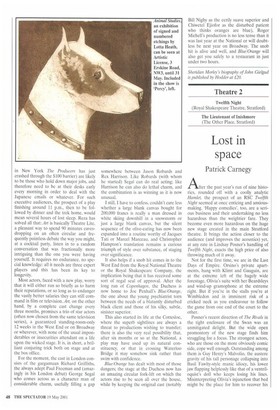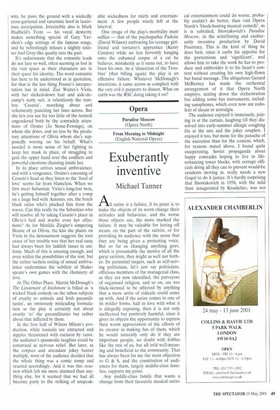Theatre 2
Twelfth Night (Royal Shakespeare Theatre, Stratford) The Lieutenant of Inishmore (The Other Place, Stratford)
Lost in space
Patrick Carnegy
After the past year's run of nine histories, rounded off with a coolly analytic Hamlet, the prospect of an RSC Twelfth Night seemed at once enticing and anxiousmaking. 'Happy comedies', too, are a serious business and their undertaking no less hazardous than the weightier fare, They become even more hazardous on the huge new stage created in the main Stratford theatre. It brings the action closer to the audience (and improves the acoustics) yet, at any rate in Lindsay Posner's handling of Twelfth Night, exacts the high price of also throwing much of it away.
Not for the first time, we are in the Last Days of Empire. Orsino's private apartments, hung with Klimt and Gauguin, are at the extreme left of the hugely wide forestage, Olivia's suite with her Beardsleys and wind-up gramophone at the extreme right. But if you're in the stalls you're at Wimbledon and in imminent risk of a cricked neck as you endeavour to follow the game from one end of the court to the other.
Posner's recent direction of The Rivals in the tight enclosure of the Swan was an unmitigated delight. But the wide open promontory of the new stage finds him struggling for a focus. The strongest actors, who are those on the more obviously comic side, cope well enough. Outstanding among them is Guy Henry's Malvolio, the austere gravity of his tail personage collapsing into Basil Fawity-style manic idiocy, his lower jaw flapping helplessly like that of a ventriloquist's doll who keeps losing his lines, Misinterpreting Olivia's injunction that bed might be the place for him to recover his
wits. he paws the ground with a wickedly cross-gartered and saturnine hoof in lascivious anticipation. Irresistible also is Mark Hadfield's Feste — his vocal dexterity makes something special of Gary Yershon's edgy settings of the famous songs, and he refreshingly infuses a slightly sinister Joel Grey-like quality into the part.
It's unfortunate that the romantic leads do not fare so well, often seeming as lost in the vast space as their characters are in their quest for identity. The word romantic has here to be understood as in quotation, for that is the last thing Posner's interpretation has in mind. Zoe Waites's Viola, with her slicked-down hair and aide-decamp's natty suit, is relentlessly the tomboy 'Cesario', marching about and vehemently punching her lines across. But she lets you see far too little of the turmoil engendered both by the comradely attentions of Orsino (To Stone-Fewings), on whom she dotes, and no less by the predatory attentions of Olivia whom she's supposedly wooing on his behalf. What's needed is more sense of her fighting to keep her mask in place, of struggling to gain the upper hand over the conflicts and powerful emotions churning inside her.
In its place arrives sexual ambivalence, and with a vengeance. Orsino's caressing of Cesario's head as they listen to the 'food of love' seems far from blameless. When we first meet Sebastian, Viola's long-lost twin, he's getting himself together after a romp on a large bed with Antonio, yes, the butch black sailor who's plucked him from the waves. Can this really be the Sebastian who will resolve all by taking Cesario's place in Olivia's bed and maybe even her affections? As for Matilda Ziegler's simpering Sloane of an Olivia, the kiss she plants on Viola in the denouement suggests the root cause of her trouble was that her real taste had always been for laddish lasses in uniform. Much of this is amusing enough, and even within the possibilities of the text, but the rather tactless outing of sexual ambivalence undermines the subtlety of Shakespeare's own games with the chemistry of love.
At The Other Place, Martin McDonagh's The Lieutenant of Inishmore is billed as 'a wicked black comedy on the taboo subjects of cruelty to animals and Irish paramilitaries', an ominously misleading formulation as the play is certainly not about cruelty 'to' the paramilitaries but rather about that inflicted by them.
In the first half of Wilson Milom's production, while toenails are extracted and nipples threatened with excision by razor, the audience's spasmodic laughter could be construed as nervous relief. But later, as the corpses and attendant jokey banter multiply, most of the audience decided that the whole thing was a comic romp and reacted accordingly. And it was this reaction which left me more alarmed than anything else, for it seemed that we had all become party to the milking of unspeak
able wickedness for mirth and entertainment. A few people wisely left at the interval.
One image of the play's morbidity must suffice — that of the psychopathic Padraic (David Wilmot) embracing his teenage girlfriend and torturer's apprentice (Kerry Condon) while no less fervently hanging onto the exhumed corpse of a cat he believes, mistakenly as it turns out, to have been his own. As a 'dissection of the Troubles' (that billing again) the play is an offensive failure. Whatever McDonagh's intentions, it came across as complicit with the very evil it purports to dissect. What on earth was the RSC doing taking it on?



































































 Previous page
Previous page